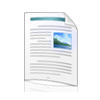De la République des lettres aux lettres de la République
- Auteur : Gengembre, Gérard
- Résumé en anglais : At the junction of a political liberation and of an intellectual liberation, 1789 is a time of the exploding word and writing. Exchanges, comments, discussions about an expanded dissemination of the paper : journals, satirical tracts, almanacs, songs, posters... On-the-spot comments, popular literature directed on the event : the fresh information press is expanding (335 titles in 1790) and cataloguing is being liberated. Political freedom and eloquence are now closely linked. The new journalist, a denouncer and a speaker, publishes and is directly involved in History. The man of letters, serving the Revolution, is loosing his throne and ranks now within the society. The literature, above all theatre, is attempting to promote new values.
- Résumé : A la conjonction d'une libération politique et d'une libération intellectuelle, 1789 connaît l'explosion de la parole et de l'écrit. Echanges, commentaires, discussions autour d'une diffusion démultipliée du papier : journaux, pamphlets, almanachs, chansons, affiches... Ecrits de l'éphémère, commentaires à chaud, littérature populaire directement articulée sur l'événement : la presse d'information rapide explose (335 titres en 1790), et le langage se libère. Liberté politique et éloquence ont partie liée. Le journaliste moderne - colporteur, tribun, dénonciateur, orateur public - intervient directement dans l'histoire. L'homme de lettres, au service de la Révolution, perd son trône et s'inscrit dans la société. Redéfinition du rôle de la littérature qui essaie de promouvoir des nouvelles valeurs ; le théâtre y réussit particulièrement.
- Paru dans le numéro : n°2-3 : 1789-1989
- Licence de diffusion : Tous droits réservés
- Format : Fichier XML
- Étendue : 48206
- Date de publication : 1989
- Langue : fr
- Sujet(s) : littérature , Révolution française (1789)
- Type de ressource : Text
Ce document est également disponible dans le format suivant :
Ce document fait partie de :

